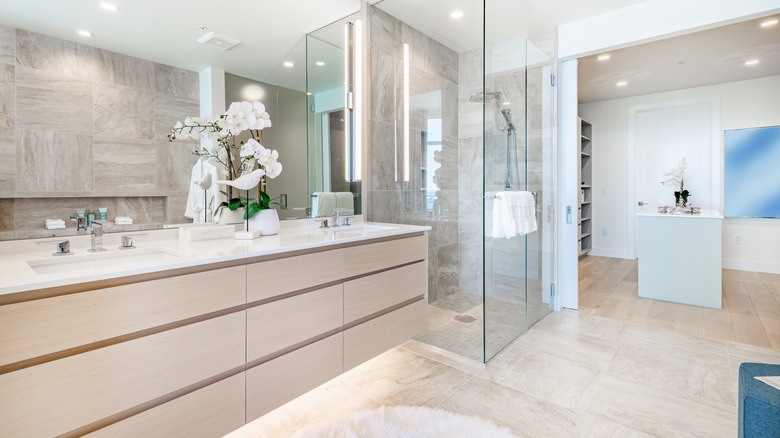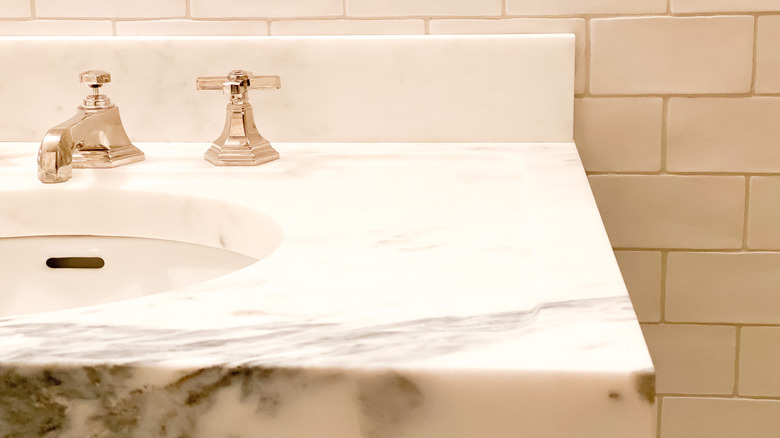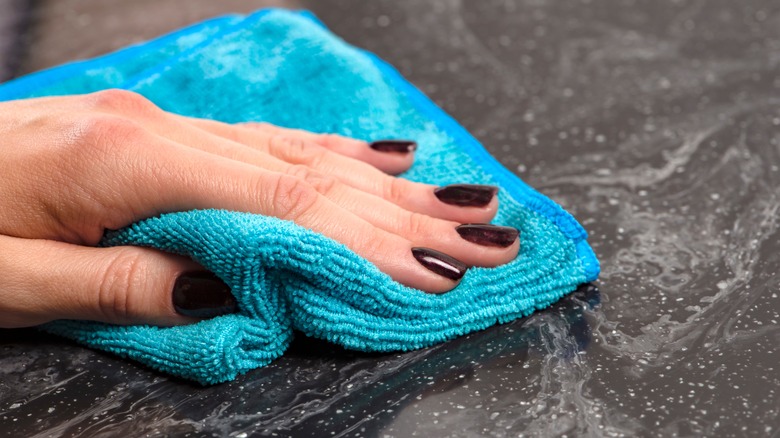The One-Of-A-Kind Countertop Material That's A Game Changer For Bathroom Design
We may receive a commission on purchases made from links.
If you're thinking of renovating your bath, nothing will make it look more lustrous and appealing faster than upgrading the countertops. Bathroom countertops need to be waterproof, durable, and easy to clean. It also helps if the material is budget-friendly, but most of all countertops need to be attractive and fit in with your decor. Even with these parameters you have a lot of options such as tile, laminate, and natural stone from marble to granite. Recently recommended by HGTV host Christina Hall is porcelain, a clay-based man-made material that has a luminous finish similar to marble but is scratch resistant and non-porous.
But for our money, the one-of-a-kind countertop material that's a game changer for bathroom design is quartzite. This is a type of rock formed inside the earth's crust through a millennia of pressure and heat. Quartzite is so tough manufacturers can only create slabs of it for countertops using a diamond blade. Quartzite and quartz have similar properties, but while quartzite is a natural material, quartz countertops are manufactured using quartz, glass, stone, and resin.
The benefits of quartzite counters
Quartzite has a lot going for it. It's an extremely hard material that's chip- and scratch-resistant. Additionally it won't warp or fade, even when regularly exposed to the strongest sunlight. Quartzite is mined, then cut to fit your bathroom countertop. Unlike manufactured products, every piece of quartzite differs from every other piece, giving you literally a one-of-a-kind product. The naturally occurring veins that run in some pieces are reminiscent of marble, but quartzite is a much tougher surface.
We've talked about the difference between quartz and quartzite, and significantly, quartz countertops often have pigment added into the mix. Quartzite, though, comes only in the colors that nature gave it, prominently gray, white, black and beige, and its ingrained natural swirls and patterns lend a lot of character to the surface, according to HGTV's Jenn Todryk. The neutral hues and organic patterns of quartzite are easy to integrate into the overall design and color scheme in the rest of the space.
Care and costs
Because it's porous, a quartzite countertop needs to be sealed to prevent spilled lotion or oils from seeping into the surface. It's easy to obtain a sealant from home improvement stores and apply it yourself. Or, try Stone Care sealer from Amazon for $22.48 a bottle. With this treatment, cleaning quartzite countertops is easy. Experts recommend that you reseal your countertops once a year.
Once that's completed, quartzite counters are practically maintenance-free. Use regular soap and water to clean them, avoiding harsh chemicals or anything acidic like vinegar, bleach, or lemon juice as these can damage the sealant. You also want to avoid using anything abrasive for the same reason. A daily wipe with a soft cloth will keep your counters pristine.
Naturally beautiful, nearly maintenance-free, durable, and stylish — what's not to love about quartzite? We will say that its initial cost is higher than many other materials. Wood, laminate, tile, even granite is all less expensive. Experts estimate quartzite slabs run from $30 to $150 per square foot before installation, a price comparable to marble.


